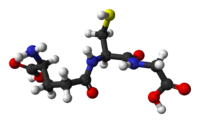
Photo from wikipedia
Volatile anesthetics are widely used inhalation anesthetics in clinical anesthesia. In recent years, the regulation of anti-cancer relevant signaling of volatile anesthetics has drawn the attention of investigators. However, their… Click to show full abstract
Volatile anesthetics are widely used inhalation anesthetics in clinical anesthesia. In recent years, the regulation of anti-cancer relevant signaling of volatile anesthetics has drawn the attention of investigators. However, their underlying mechanism remains unclear. This review summarizes the research progress on the regulation of anti-cancer relevant signaling of volatile anesthetics, including sevoflurane, desflurane, xenon, isoflurane, and halothane in vitro, in vivo, and clinical studies. The present review article aims to provide a general overview of regulation of anti-cancer relevant signaling and explore potential underlying molecular mechanisms of volatile anesthetics. It may promote promising insights of guiding clinical anesthesia procedure and instructing enhance recovery after surgery (ERAS) with latent benefits.
Journal Title: Frontiers in Oncology
Year Published: 2021
Link to full text (if available)
Share on Social Media: Sign Up to like & get
recommendations!